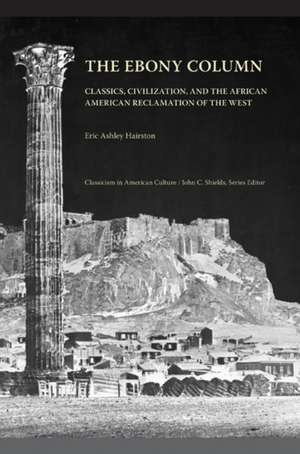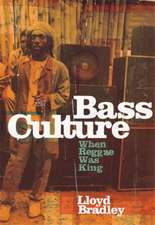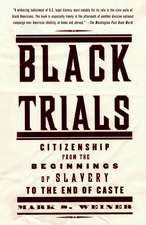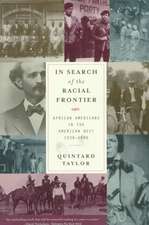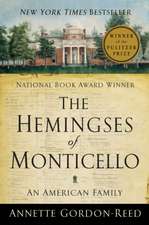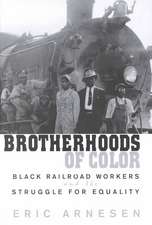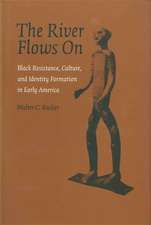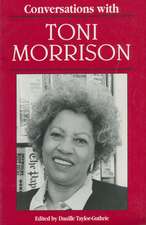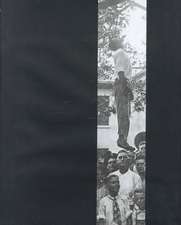The Ebony Column: Classics, Civilization, and the African American Reclamation of the West
Autor Eric Ashley Hairstonen Limba Engleză Paperback – 15 ian 2016
“The Ebony Column is superbly researched, skillfully utilizing primary and secondary sources and the most up-to-date scholarship. i was impressed by the amount of deep archival research that was conducted in order to complete this book.” —Cedrick May, author of Evangelism and Resistance in the Black Atlantic, 1760–1835
In The Ebony Column, Eric Ashley Hairston begins a new thread in the ongoing conversation about the influence of Greek and Roman antiquity on U.S. civilization and education. While that discussion has yielded many exceptional insights into antiquity and the American experience, it has so regularly elided the African American component that all classical influence on black writing and thought seems to vanish.
That omission, Hairston contends, is disturbing not least because of its longevity— from an early period of overt stereotyping and institutionalized racism right up to the contemporary and, one would hope, more cosmopolitan and enlightened era. Challenging and correcting that persistent shortsightedness, Hairston examines several prominent black writers’ and scholars’ deep investment in the classics as individuals, as well as the broader cultural investment in the classics and the values of the ancient world. Beginning with the late-eighteenth-century verse of Phillis Wheatley, whose classically inspired poems functioned as a kind of Trojan horse to defeat white oppression, Hairston goes on to consider the oratory of Frederick Douglass, whose rhetoric and ideas of virtue were much influenced by Cicero, and the writings of educator Anna Julia Cooper, whose classical training was a key source of her vibrant feminism. Finally, he offers a fresh examination of W. E. B. DuBois’s seminal The Souls of Black Folk (1903) and its debt to antiquity, which volumes of commentary have largely overlooked.
The first book to appear in a new series, Classicism in American Culture, The Ebony Column passionately demonstrates how the myths, cultures, and ideals of antiquity helped African Americans reconceptualize their role in a Euro-American world determined to make them mere economic commodities and emblems of moral and intellectual decay. To figures such as Wheatley, Douglass, Cooper, and DuBois, classical literature offered striking moral, intellectual, and philosophical alternatives to a viciously exclusionary vision of humanity, Africanity, the life of the citizen, and the life of the mind.
Eric Ashley Hairston is Associate Professor of English and of Law and Humanities at Elon University. He was a contributor to New Essays on Phillis Wheatley, edited by John C. Shields.
In The Ebony Column, Eric Ashley Hairston begins a new thread in the ongoing conversation about the influence of Greek and Roman antiquity on U.S. civilization and education. While that discussion has yielded many exceptional insights into antiquity and the American experience, it has so regularly elided the African American component that all classical influence on black writing and thought seems to vanish.
That omission, Hairston contends, is disturbing not least because of its longevity— from an early period of overt stereotyping and institutionalized racism right up to the contemporary and, one would hope, more cosmopolitan and enlightened era. Challenging and correcting that persistent shortsightedness, Hairston examines several prominent black writers’ and scholars’ deep investment in the classics as individuals, as well as the broader cultural investment in the classics and the values of the ancient world. Beginning with the late-eighteenth-century verse of Phillis Wheatley, whose classically inspired poems functioned as a kind of Trojan horse to defeat white oppression, Hairston goes on to consider the oratory of Frederick Douglass, whose rhetoric and ideas of virtue were much influenced by Cicero, and the writings of educator Anna Julia Cooper, whose classical training was a key source of her vibrant feminism. Finally, he offers a fresh examination of W. E. B. DuBois’s seminal The Souls of Black Folk (1903) and its debt to antiquity, which volumes of commentary have largely overlooked.
The first book to appear in a new series, Classicism in American Culture, The Ebony Column passionately demonstrates how the myths, cultures, and ideals of antiquity helped African Americans reconceptualize their role in a Euro-American world determined to make them mere economic commodities and emblems of moral and intellectual decay. To figures such as Wheatley, Douglass, Cooper, and DuBois, classical literature offered striking moral, intellectual, and philosophical alternatives to a viciously exclusionary vision of humanity, Africanity, the life of the citizen, and the life of the mind.
Eric Ashley Hairston is Associate Professor of English and of Law and Humanities at Elon University. He was a contributor to New Essays on Phillis Wheatley, edited by John C. Shields.
Preț: 222.97 lei
Nou
Puncte Express: 334
Preț estimativ în valută:
42.66€ • 44.55$ • 35.31£
42.66€ • 44.55$ • 35.31£
Carte tipărită la comandă
Livrare economică 04-18 aprilie
Preluare comenzi: 021 569.72.76
Specificații
ISBN-13: 9781621902300
ISBN-10: 1621902307
Pagini: 280
Dimensiuni: 152 x 229 x 25 mm
Greutate: 0.57 kg
Editura: University of Tennessee Press
Colecția Univ Tennessee Press
ISBN-10: 1621902307
Pagini: 280
Dimensiuni: 152 x 229 x 25 mm
Greutate: 0.57 kg
Editura: University of Tennessee Press
Colecția Univ Tennessee Press
Notă biografică
Eric Ashley Hairston is Associate Professor of English and of Law and Humanities at Elon University. He was a contributor to New Essays on Phillis Wheatley, edited by John C. Shields.
Recenzii
“The Ebony Column is superbly researched, skillfully utilizing primary and secondary sources and the most up-to-date scholarship. i was impressed by the amount of deep archival research that was conducted in order to complete this book.” —Cedrick May, author of Evangelism and Resistance in the Black Atlantic, 1760–1835
“There is much about Hairston’s scholarship to appreciate. He has clearly immersed himself in an array of primary and secondary sources, and he shows a firm command of classical literature and African American history. For that reason this book should appeal to scholars in both fields.” —Journal of Southern History
